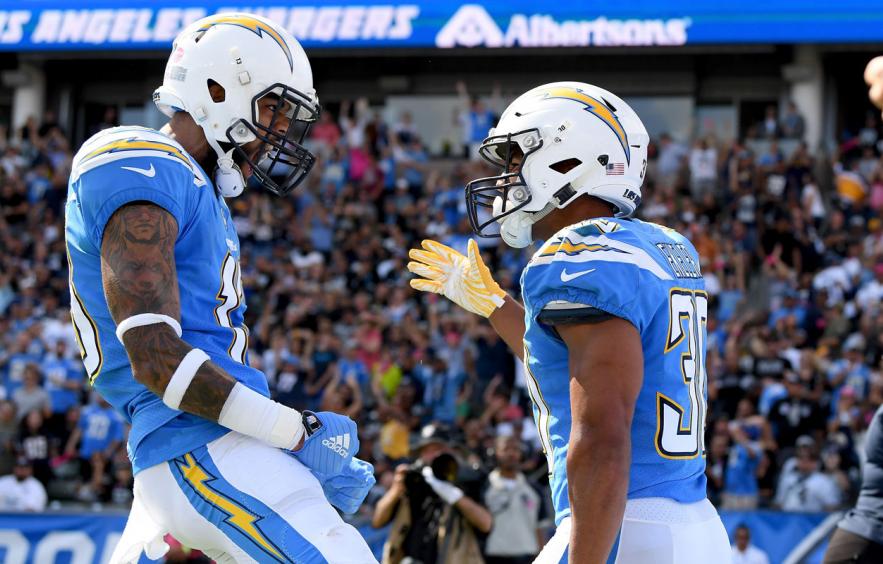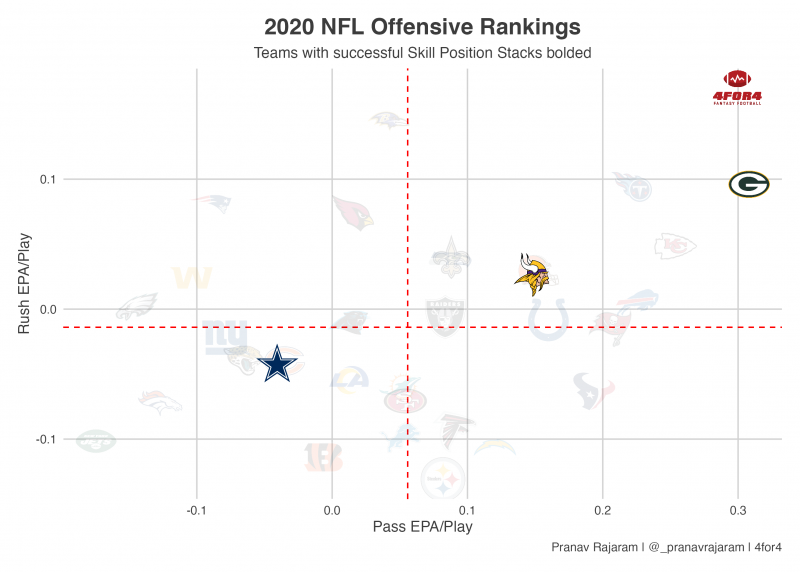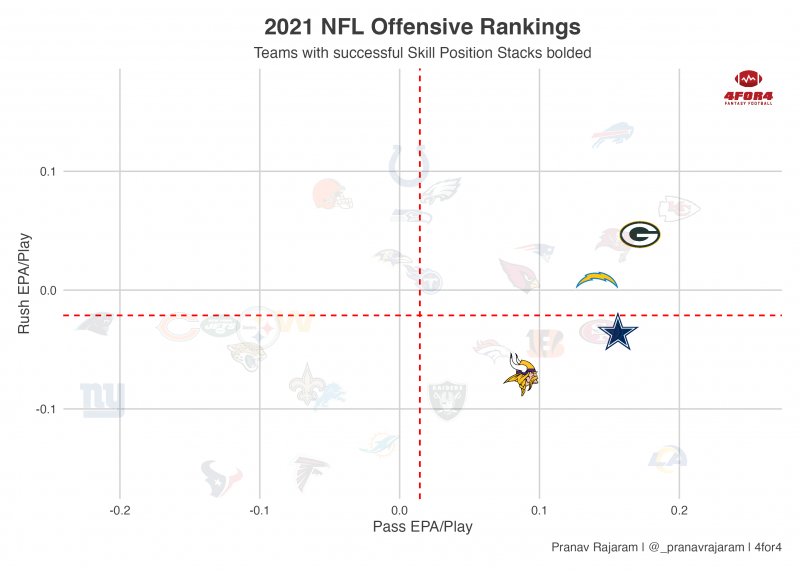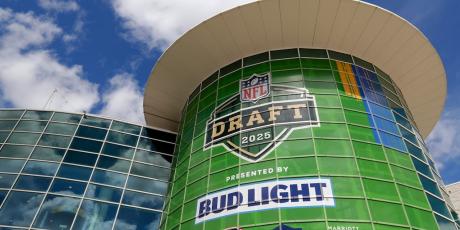The Skill Position Stack: A Fantasy Football Strategy Analysis

Fantasy managers are likely familiar with the phrase “stacking”. The term describes when you have two players from the same NFL team in your fantasy lineup. In most cases, stacking has been used to express a quarterback paired with one of his wide receivers. However, I’m going to look at a different, less thought-about version of this idea: the RB/WR, or “skill position” stack. This concept is based on the same principles as the QB/WR stack, but instead involves pairing a team’s top running back and receiver. In this article, I’ll try and answer the question: when can the skill position stack be a potentially viable fantasy strategy, and when should you avoid it?
One note before we get started: I defined a skill position stack as an RB and WR on the same team that both had an ADP in the first three rounds of fantasy drafts, as the early rounds are when the strategy of stacking is a real question (because you would be tying your team’s best players to one offense). In later rounds, one of the players in the stack might be a FLEX or off the bench for your team, so it is less of a risk to try it out. To the data!
Stacks That Worked
Let’s first examine some of the RB/WR stacks that would have been beneficial for your team if you employed them. Since 2019, there have been a total of 26 possible skill position stacks (9 in 2019, 8 in 2020, and 9 in 2021). Of these, 11 were a “success”, which I generously defined as having both the running back and wide receiver in the stack finishing in the top-20 at their position in fantasy points per game (minimum 10 games played).
2019 Skill Position Stacks
| Team | Player | ADP | Finish |
|---|---|---|---|
| ATL | Devonta Freeman | RB19 | RB20 |
| ATL | Julio Jones | WR3 | WR3 |
| DAL | Ezekiel Elliott | RB4 | RB5 |
| DAL | Amari Cooper | WR12 | WR15 |
| GB | Aaron Jones | RB15 | RB3 |
| GB | Davante Adams | WR2 | WR6 |
| NO | Alvin Kamara | RB2 | RB8 |
| NO | Michael Thomas | WR5 | WR1 |
Here’s a look at the stacks which I considered to be a success from the 2019-20 NFL season. The thing that jumps off the page most is that all four of these combos were on solid offenses with a good quarterback.

In this graph, we can see that the four teams in question all had above-average passing offenses, and most were also strong in the run game. This makes logical sense, as better offenses will score more points resulting in more players being fantasy-relevant.
Another point of interest is that all of the receivers in the successful stacks were the clear top dog in their receiving rooms—nobody was a threat to take volume away from guys like Davante Adams and Michael Thomas. This is another thing we should look out for when drafting stacks—after all, if we’re funneling a lot of draft capital into one NFL offense, it would be nice to make sure that both the RB and WR see as much volume as possible.
It might seem a little basic, but one final note is that all eight of these players were some of the best at their position from a pure football standpoint. Us fantasy players can sometimes get swept up into hype trains and inflate the value of a player who might not actually be that good (I call this the Kenyan Drake effect), so it is good to know that with skill positions stacks, managers shouldn’t overthink it.
2020 Skill Position Stacks
| Team | Player | ADP | Finish |
|---|---|---|---|
| DAL | Ezekiel Elliott | RB3 | RB14 |
| DAL | Amari Cooper | WR9 | WR20 |
| GB | Aaron Jones | RB13 | RB4 |
| GB | Davante Adams | RB2 | WR1 |
| MIN | Dalvin Cook | RB6 | RB2 |
| MIN | Adam Thielen | WR8 | WR11 |
Once again, we can see that these three successes all came from teams with good quarterbacks—Aaron Rodgers, Kirk Cousins, and Dak Prescott are all arguably top-10 QBs in the league.
While the Cowboys seem to be a bit of an outlier here, this is likely explained by Dak Prescott’s unfortunate Week 5 injury in 2020 that threw the Dallas offense off in a big way. It makes sense that Amari Cooper and Ezekiel Elliott barely made it into the top 20 as the height of their production probably came in the first few weeks with Prescott.
We can also add another bit of nuance to a trend we observed in 2019’s data. While Adam Thielen was not the clear alpha receiver on the 2020 Vikings (he competed with Justin Jefferson for targets), he scored a whopping 14 touchdowns, telling us that being a good red zone threat might be something to look out for in Skill Position stacks. This notion is reflected in Davante Adams’ consistent presence on these lists, as he is second in the NFL in receiving touchdowns over the past three seasons.
2021 Skill Position Stacks
| Team | Player | ADP | Finish |
|---|---|---|---|
| DAL | Ezekiel Elliott | RB5 | RB15 |
| DAL | CeeDee Lamb | WR10 | WR16 |
| GB | Aaron Jones | RB6 | RB14 |
| GB | Davante Adams | WR1 | WR2 |
| LAC | Austin Ekeler | RB7 | RB2 |
| LAC | Keenan Allen | WR9 | WR10 |
| MIN | Dalvin Cook | RB2 | RB8 |
| MIN | Justin Jefferson | WR7 | WR4 |
I find it very intriguing that the same teams keep on popping up on the lists. While the receivers for the Cowboys and Vikings are different from before, this is likely because they simply supplanted another person as the No. 1 receiver. Our new additions to the list, Austin Ekeler and Keenan Allen, also fit the mold of what we’ve discovered to be a good RB/WR stack very well.
We can see that Ekeler and Allen check all the boxes that we’re looking for: good offense, good quarterback, clear top targets, and good at football.
Stacks That Didn’t Work
Now that we’ve looked at some of the examples of RB/WR stacks that did pan out for your fantasy team, let’s examine some of the duos that didn’t bode so well. Given there are a lot more failures than successes, I’ll simply be highlighting some general takeaways instead of getting too in-depth.
This shouldn’t come as too much of a surprise, but the unsuccessful skill position stacks followed the opposite of the trends we observed in the successful ones. As an example, let’s look at the 2021 Chicago Bears. Running back David Montgomery (RB15) and wideout Allen Robinson (WR12) were both drafted in the top-36, but did not live up to their ADP. Montgomery finished as the RB21 (13 games played), while Robinson was the WR81 (12 games played).
First things first, the Bears duo failed to meet our primary requirement—Chicago was not a good offense by any metric last season, having a very messy QB situation that managers should have been wary of. Unsurprisingly, they finished the season bottom-10 in both yards per game and points per game. While it was admittedly difficult to predict, Robinson was overtaken in the Bears WR depth chart by Darnell Mooney last season and did not lead the team in targets, meaning our second criteria was also not satisfied. This makes the ‘21 Bears a great example of what to avoid when considering a skill position stack.
The Consistency Question
One of the biggest side effects of any form of stack is the creation of a potentially boom-or-bust fantasy lineup. Because two of your best players will be teammates, the success of their team in any given week will have a larger impact. This further emphasizes the importance of picking RB/WR stacks on good teams, as we’d like for the offense to be as consistent as possible.
Let’s look at another case study, this time a successful duo from 2021: Davante Adams and Aaron Jones.

Here, we can see how the “high tide raises all ships” idea plays out in skill position stacks. Out of Davante’s 11 top-24 finishes last season, Jones finished in the top-24 that same week eight times. This makes a lot of sense—when the Packers dropped 45 points on the Bears in Week 14, Adams and Jones each finishing as top-10 options checks out. On the other hand, when the Packers got embarrassed by the Saints by a score of 38-3 in Week 1, it is understandable that both Adams and Jones were awful for fantasy.
This idea of weekly variability in RB/WR stacks will likely influence your in-season management. For example, if your stack has a matchup against a difficult defense that has a chance of being a low-scoring slugfest, it is possible that neither player in the stack is able to produce for your team and you might have to consider benching them. It is obviously difficult to bench a superstar à la Davante Adams, so in drafts, one way you could try and build around a stack is to surround them with high-floor players as opposed to volatile ones (such as picking someone like Brandin Cooks over DK Metcalf). That way, the week-by-week inconsistency of the stack will be offset by dependable players, creating a one-two punch that will steady the course for your team.
Potential 2022 Skill Position Stacks
Now that we’ve established some things that we want and don’t want in RB/WR stacks, we can apply our knowledge to 2022 and see if there are any worth considering.
| Team | Player | ADP | Rank |
|---|---|---|---|
| ARI | James Conner | 33 | RB14 |
| ARI | Marquise Brown | 36 | WR14 |
| CAR | Christian McCaffrey | 2 | RB2 |
| CAR | D.J. Moore | 31 | WR13 |
| CIN | Joe Mixon | 14 | RB7 |
| CIN | Ja’Marr Chase | 5 | WR3 |
| IND | Jonathan Taylor | 1 | RB1 |
| IND | Michael Pittman | 30 | WR12 |
| LAC | Austin Ekeler | 6 | RB3 |
| LAC | Keenan Allen | 27 | WR11 |
| MIN | Dalvin Cook | 9 | RB5 |
| MIN | Justin Jefferson | 4 | WR2 |
| TB | Leonard Fournette | 21 | RB11 |
| TB | Mike Evans | 16 | WR7 |
Here are the seven possible skill position stacks you could go with this season. Let’s break these down one by one.
James Conner (RB14) & Marquise Brown (WR14), Cardinals
This Cardinals tandem is an interesting case study. The question of whether or not the Arizona offense will be good is a tricky one to answer, as they have been rather up and down with Kyler Murray under center. However, even if they manage to be consistent for the whole season, superstar receiver DeAndre Hopkins is set to return from suspension in Week 7 and be the top target through the air once again. This means that Hollywood will likely see a drop-off in production at the end of the year, so I would avoid the Cardinals’ skill position stack this season.
Christian McCaffrey (RB2) & D.J. Moore (WR13), Panthers
Whether you believe in the Panthers' RB/WR stack is directly tied to your opinions on Baker Mayfield. If you think Baker has a career resurgence in Carolina (which I personally think will happen), then this stack should work out well. When healthy, CMC is arguably the best fantasy asset in the NFL, and D.J. Moore is an excellent receiver with three straight 1,000-yard seasons despite horrible quarterback play. If you grab McCaffrey with the first few picks in your draft and add Moore as the WR2 for your team in the third or fourth round, it could be a potentially excellent combination. However, if you don’t think Baker is the answer for the Panthers, then stay away from this one.
Joe Mixon (RB7) & Ja’Marr Chase (WR3), Bengals
This is probably the most star-studded duo on our list. Mixon and Chase are both household names that have proven to be elite fantasy players already. They are also on a great offense with a still-improving quarterback in Joe Burrow. However, Chase will be forced to compete for targets with Tee Higgins, who is being drafted rather high in fantasy as well (WR10). Pair this with potential regression for Chase (he had seven 40+ yard touchdowns last season), and I would be a little nervous about pairing Mixon and Chase together as they would have to be RB1 and WR1 for your team. That is a little too much invested in one offense for me to be comfortable.
Jonathan Taylor (RB1) & Michael Pittman Jr. (WR12), Colts
This combo just missed out on being on the list last season—while Taylor was the RB1, Pittman was just outside the top-20 at the receiver position. However, with Matt Ryan coming in and replacing Carson Wentz at quarterback for Indy, this has the makings of a very strong stack. Taylor is obviously an elite runner, and Pittman is all alone at the top of the Colts' WR depth chart (sorry to the Keke Coutee truthers). Matty Ice will almost certainly be an upgrade over Wentz, so this stack is a more bankable version of the Panthers one—if you are able to take Taylor with the 1.01 and then add Pittman as a WR2, it will certainly not hurt your team.
Austin Ekeler (RB3) & Keenan Allen (WR11), Chargers
One of our stacking models from last season, this Chargers duo could very likely repeat as a stack that works. The main factor that their success will depend on is Mike Williams. If Mikey Dubs, who is currently being drafted right behind Allen as the WR12, can finally put it all together and be a consistent fantasy option, then he might actually be a better option than Allen for this stack. Given how good Justin Herbert is, I would be comfortable pairing Ekeler with either of the two LA receivers, but only as your WR2. For example, you could start your draft taking Ekeler in the first, some other elite receiver in the second (like CeeDee Lamb or Tyreek Hill), and then Allen or Williams in the third.
Dalvin Cook (RB5) & Justin Jefferson (WR2), Vikings
Unfortunately, while the Vikings have produced incredibly successful skill position stacks of late, this one is probably impossible to achieve as both Cook and Jefferson are firmly going in the first round of fantasy drafts this year.
Leonard Fournette (RB11) & Mike Evans (WR7), Buccaneers
Last but certainly not least, Lenny and Evans are my favorite RB/WR stack for this year. In his storied career, Tom Brady has never really had an elite skill position combo like this one, and it could be dynamite. With Ronald Jones now in Kansas City, Fournette will be the bellcow for Tampa and see all of the work out of the backfield. With Chris Godwin still recovering from an ACL tear and Rob Gronkowski now retired, Evans will similarly be the indisputable top target for the GOAT. Given their ADPs, you could potentially start your draft with a top-5 player like Derrick Henry or Cooper Kupp in the first, and then take Evans and Fournette in the second and third rounds. This is a stack to actively pursue in 2022.
The Bottom Line
- Early-round RB/WR stacking is an intriguing strategy that could work out many different ways for your team.
- The successful skill position stacks tend to come from elite offenses where the players involved are the clear top options at their position.
- Conversely, the unsuccessful stacks have generally been due to poor quarterback play and having too much invested in a bad offense.
- With stacks come potential volatility for your lineup. To remedy this, it would be wise to load up on high-floor players surrounding your stack to ensure your team is not a complete bust in bad weeks.
- While there are some stacks to stay away from this season, there are a few RB/WR combos that fit the bill of being successful and could add a dynamic and exciting twist to your fantasy lineup.



















